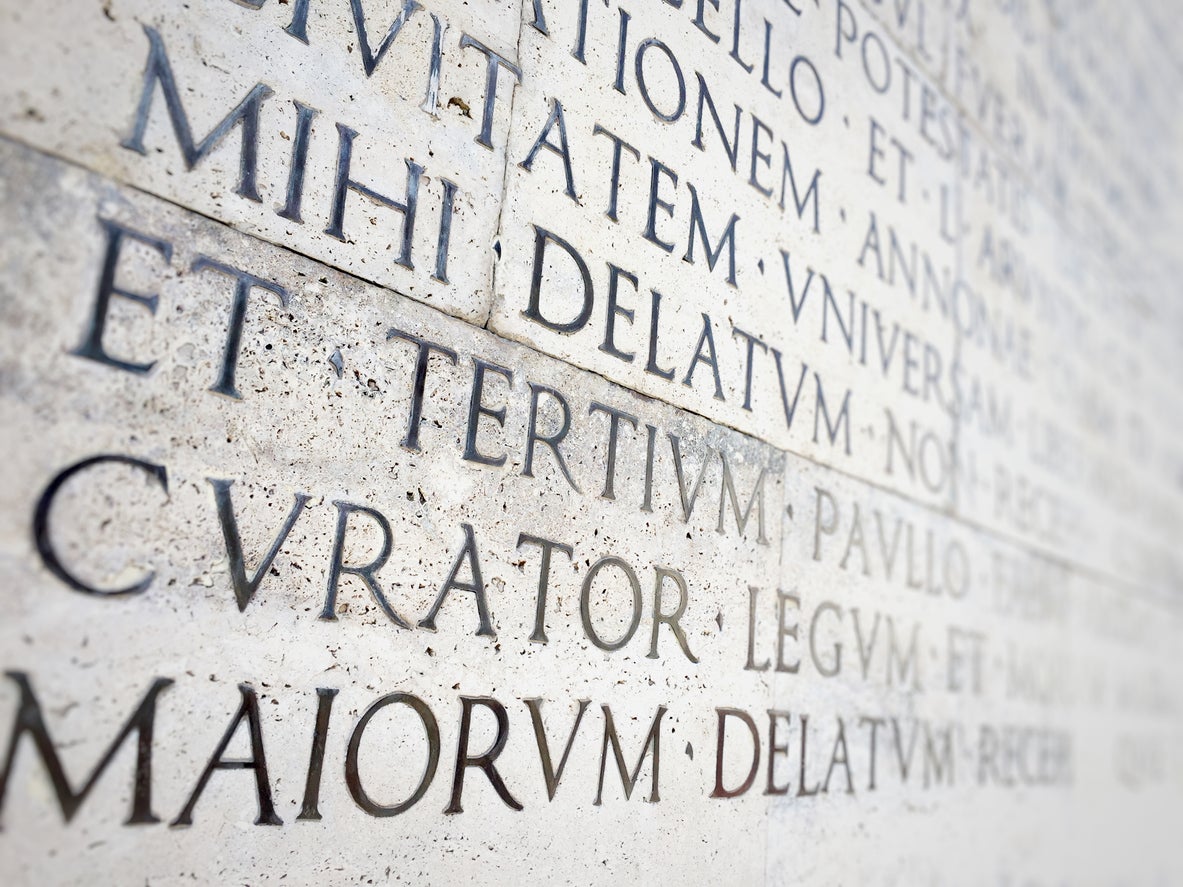Why shouldn’t state school pupils study Latin? Or are we all just here to toil our days away?
We live in a society in which the lucky few are invited to think, and the unfortunate masses must instead simply do – a subject such as Latin could help to change this


Your support helps us to tell the story
From reproductive rights to climate change to Big Tech, The Independent is on the ground when the story is developing. Whether it's investigating the financials of Elon Musk's pro-Trump PAC or producing our latest documentary, 'The A Word', which shines a light on the American women fighting for reproductive rights, we know how important it is to parse out the facts from the messaging.
At such a critical moment in US history, we need reporters on the ground. Your donation allows us to keep sending journalists to speak to both sides of the story.
The Independent is trusted by Americans across the entire political spectrum. And unlike many other quality news outlets, we choose not to lock Americans out of our reporting and analysis with paywalls. We believe quality journalism should be available to everyone, paid for by those who can afford it.
Your support makes all the difference.Cogito, ergo sum – or, written plainly for working-class Latin illiterates like myself: I think, therefore I am. This was first written by French philosopher and mathematician Descartes in 1637. Man’s existence was assured by his ability to think. That is, of course, an elementary explanation of Descartes’ philosophy, but having watched a few YouTube videos, that is my basic understanding.
Sadly today, thinking, pondering, philosophising and ruminating are viewed by many as useless escapades. After all, can it help to boost your employability? Will it prepare you for a life in industry or a soul-crushing career? Does it provide transferable skills? We live in a society in which the lucky few are invited to think, and the unfortunate masses must instead simply do. Perhaps, if Descartes were alive today, he may instead have concluded: I work, therefore I am.
Often it isn’t teachers who want to suppress working-class ambition and the desire to learn for the sake of learning. Instead, this reticence breeds within our own families. Subjects must have a purpose, should be entirely logical, and should offer a clear pathway to a stable career.
Classics, for example, is looked upon distrustfully as being both posh and pointless. And then there are the concerned middle-class missionaries who, upon hearing the news of the government’s plan to extend Latin lessons to thousands of pupils, asked whether something like funding for ICT might be more worthwhile. It shows a basic lack of respect and optimism for working-class intelligence and drive. Working-class children are not born to enjoy life, it seems; they are born to endure.
I haven’t always been Gavin Williamson’s biggest fan. His response to the disruption of children’s education during the pandemic has been haphazard and chaotic. But surprisingly, I think his proposal to introduce Latin to a wider audience is both refreshing and important.
He recently stated: “We know Latin has a reputation as an elitist subject which is only reserved for the privileged few. But the subject can bring many benefits to young people, so I want to put an end to that divide. There should be no difference in what pupils learn at state schools and independent schools.”
Not only will the scheme offer thousands of students from some of the most deprived areas the opportunity to access this rich subject, but it will also include trips to ancient Roman sites.
In this time of Twitter outrage and performative backlash against every political scheme imaginable, this statement sent many into meltdown. “But Latin is a dead language”; “What is the point?”.
Well, what is the point in anything? I’ve yet to use algebra in my daily life, despite my teachers insisting that it would be beneficial for baking. I don’t remember being asked in an interview what my thoughts were on Rasputin despite dedicating months to studying him as a teen.
We have got into this depressing habit of believing that everything must prepare you for the workplace. That earning potential is the only way to emancipate yourself from humble beginnings. Everything is based on risk, and unfortunately, opening your mind to the treasure trove of ideas and literature from the past makes you, in effect, socially uninsurable.
I attended a seriously run-down state school. Head teachers came and went. The highlight of our day was when a stray dog from the local estate decided to break in and run around with manic enthusiasm. Locally, the school was nicknamed “Strangeways”. But we had potential, and lots of us were indeed bright. Sadly, there were some teachers who expected very little from us, so we would become bored by the lack of challenging work.
In my final year, we were all given the opportunity to meet with a careers adviser. He asked me what I wanted to do and I replied that I would love to study History of Art. He laughed and said, “That isn’t a degree that people like you study. You need to be reasonable.”
However, there were some who pushed us, made us think, and introduced us to new and exciting worlds. My English teacher, despite not having to do so, would bring in copies of Wilde and loan them to willing readers.
Maybe I would have loved to study Latin. Maybe I wouldn’t. But I wasn’t given the opportunity to find out. From what I have read, it provides you with a grounding knowledge of many romantic languages and opens up exciting texts and ideas to be explored. Not to mention the fascinating history of the Roman empire.
After embarking on an adult access course (and passing with flying colours), I was given a place to study at a red-brick university in Manchester. Immediately, I was placed next to students who came from some of the best private schools in the country. I could compete with the best of them, but there were some conversations that left me drowning. I had to read 10 times more than they did to play catch-up and merely to fit in. Of course, Latin featured.
Our class system is rigid and seemingly impenetrable. Many bemoan the way it allows inequality to flourish. But it should always be remembered that education is the key to breaking this cycle. What’s more, equality of education should be paramount. Latin isn’t the sole answer to this problem, but it is a step in the right direction and it should be welcomed by all. Here’s to a nation of thinkers, immersing themselves in a subject they may well never use – and loving every minute of it.
Join our commenting forum
Join thought-provoking conversations, follow other Independent readers and see their replies
Comments